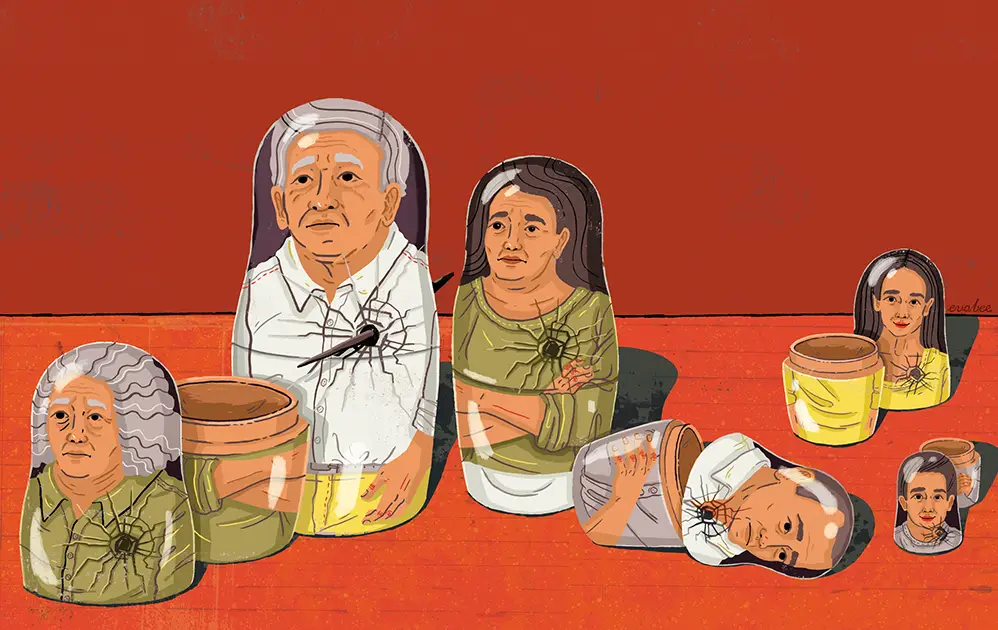Being an ABC (American born Chinese) is not easy as 1, 2, 3. Although it can be a bit confusing to navigate between two totally different cultures and mindsets, I wouldn’t give up this experience for anything.
Here are 10 struggles that come with being a second-generation Chinese American:
1. English
If you are a second-generation child of immigrants, English is most likely not your first language. Growing up as a Chinese American means learning a complicated jumble of different dialects and languages and hearing random accents unintentionally pop up in your own speech.
The mumbo-jumbo of Chinglish infiltrates basically every conversation I have with my immigrant parents. For some reason, it seems natural and even logical to tack on a Chinese accent to an English word in an effort to translate something, but hey — it works.
2. Chinese School
Almost every Chinese American kid I knew growing up went to Chinese school. As if regular school wasn’t enough, Chinese schools with different types of schedules were sure to occupy some part of a second-generation childhood.
Chinese schools, especially in San Francisco, usually teach Mandarin as well as Cantonese. As if juggling three different languages wasn’t confusing enough, going to Chinese school to learn Cantonese is on a whole other level. Both Mandarin and Cantonese generally use the same characters for reading and writing but vastly differ in formal and colloquial speech. The pronunciation of standard Chinese characters when read aloud in Cantonese is confusingly different from an actual conversation using the same words. I can’t have been the only kid who questioned why “nei si su” was read like that when people actually said “nei hai been goh” in real life (roughly translated to “who are you?”).
Although many were probably scolded for doing the wrong stroke order or for having lopsided handwriting, Chinese school definitely has a special place in the scarred hearts of a second generation Chinese American
3. Traditions
Chinese people know how to party. Most people have things like Christmas and thanksgiving, but second-generation ABCs have Spring and Mid-Autumn Moon festivals, Lunar New Years and delectable feasts for every occasion. This means there is a lot of memorizing to be done before the big days.

Just for Lunar New Years alone, there are different greetings that must be exchanged that almost becomes a contest to see how many sayings you have memorized for the year. Not to mention that every relative/family come with their own special title and simply calling them “Auntie” and “Uncle” doesn’t cut it. When in doubt, “gong hey fat choi” always comes in clutch. A slew of other things like when to wash and cut hair, what kind of dishes are served, what color qipao to wear, how far you bow to “bai sun” makes this holiday an eventful but also stressful occasion.
4. “OMG! You’re so ASIAN”
Maybe it’s the lack of representation but being called “Asian” growing up by your self-hating Asian peers usually had a negative connotation. Especially during the tween years, everything “cool” was associated with shirtless Caucasian Hollister models or vacationing in Europe while the uncool were relegated to the realm of fobs (fresh off the boat) with above average Chinese language skills.
To this day, I’m not quite sure why this phrase seemed like such an insult. The line was never uttered with a sense of amazement or appreciation — just a sense of disdain. Hopefully, everyone who still uses “Asian” to insinuate something uncool will learn to accept the Chinese part of their identity in all of its thrifty and traditional ways.
5. Learning how to use Chopsticks
Oof. The black sheep of the family is always the person who does not hold their chopsticks properly. But it’s ok, because learning how to use chopsticks is sort of like riding a bike, once you get the hang of it you never forget how to do it.
6. If it’s not an A it’s an F
One of the biggest achievements for any second-generation Chinese American is getting into college. That being said, prep schools, tutors, endless music lessons, summers full of workbooks bought at Costco is a reality that many ABC’s face.

Doing well in school correlates to a successful money-making future in the eyes of Chinese parents and that’s mostly what they want in life for their children. The nature of schooling in China is also super competitive, so it comes as no surprise that immigrant parents put the same pressure on their American born kids to do well in school. With all of this monetary investment in their children’s education, you have four different career options: doctor, lawyer, engineer or at least a CEO.
7. SO MANY AFTER SCHOOL ACTIVITIES.
If it ain’t Chinese school, it’s a music lesson of some sort. Chinese parents aren’t normally too into having their kids put into team sports, so if you’re the athletic type, say hello to swimming, gymnastics, badminton and other solo/partner sport. And for music, if you don’t take merit exams to numerically keep track of what “level” you are in your musical studies, then did you ever really play an instrument?
8. WeChat
ABC’s are quite familiar with the Chinese social media app Wechat. Who wouldn’t be? This app is all the rage with Chinese parents who turn to this for everything from reading astrological horoscopes to finding potential significant others for their adult children.
This app has managed to put first generation Chinese Americans back in constant contact with their various friends and relatives in China. Connecting back with old friends over loud voice messages must be pretty exciting. As handy as this app is, I never thought I would have to fight it for the attention of my parents during every meal time.
9. Tough Love
Being outwardly affectionate is not something that many immigrant parents are good at displaying. While there might not be many moments where you hear “I love you” or “I’m proud of you,” Chinese parents give love all the same.
Love is a home-cooked meal and a painstakingly made pot of soup. Love is working endlessly driving your second-generation kids to prep schools and music lessons. Love is immigrating to an alien country in hopes of giving your family a chance to blossom in the land of opportunity.
The word “love” might never be uttered aloud, but it resounds with every nod of approval and every frank criticism.
10. I Am Not a Model Minority
The myth of the model minority is one that is still firmly attached to the Chinese American identity today. The coining of this term and concept was not so much to praise the Asian-American demographic, but instead to pit racial groups against one another.
The incredible amount of mental pressure to excel in every aspect of life is what the model minority term has morphed into. No, things like math do not come easily to me just because I am Chinese. And no, I don’t want to be used as a term to perpetuate a prejudice against other communities of color.
Let’s not make the second-generation Chinese-American experience an example to aspire to, but as a culture to understand and occasionally, poke fun at.

















